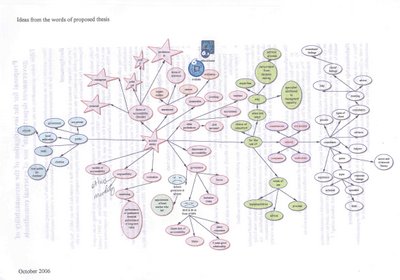"Finally, as an Invocation, we offer the following verses composed in mock despair by our first editorial reader, Jane Kepp, dictionary in hand."
The Hermeneut's Dilemma, or, A Jargon Poem
Twas prelapsarian, and the hermeneut
Sat huddled with his faithful trope,
Sunk in thaumasmus, idly strumming his lute,
Lost in subversion with nary a hope.
Then with heartfelt apoplanesis he cried,
O come, interlocutor, give me your ear!
In my pathopoeia, I've slandered and lied;
Now of my grim project this discourse you'll hear.
I've dappled in vile phenomenological rites,
And joined in a secret synecdoche,
Squandered my received knowledge in bibulous nights,
And embraced epistemological heresy.
O, but now my metonymy is too great to bear!
This ecphonesis has become too deictic to hide!
I've lost all the poesis I once held so dear . . .
And, with typical hypotyposia, he died.
